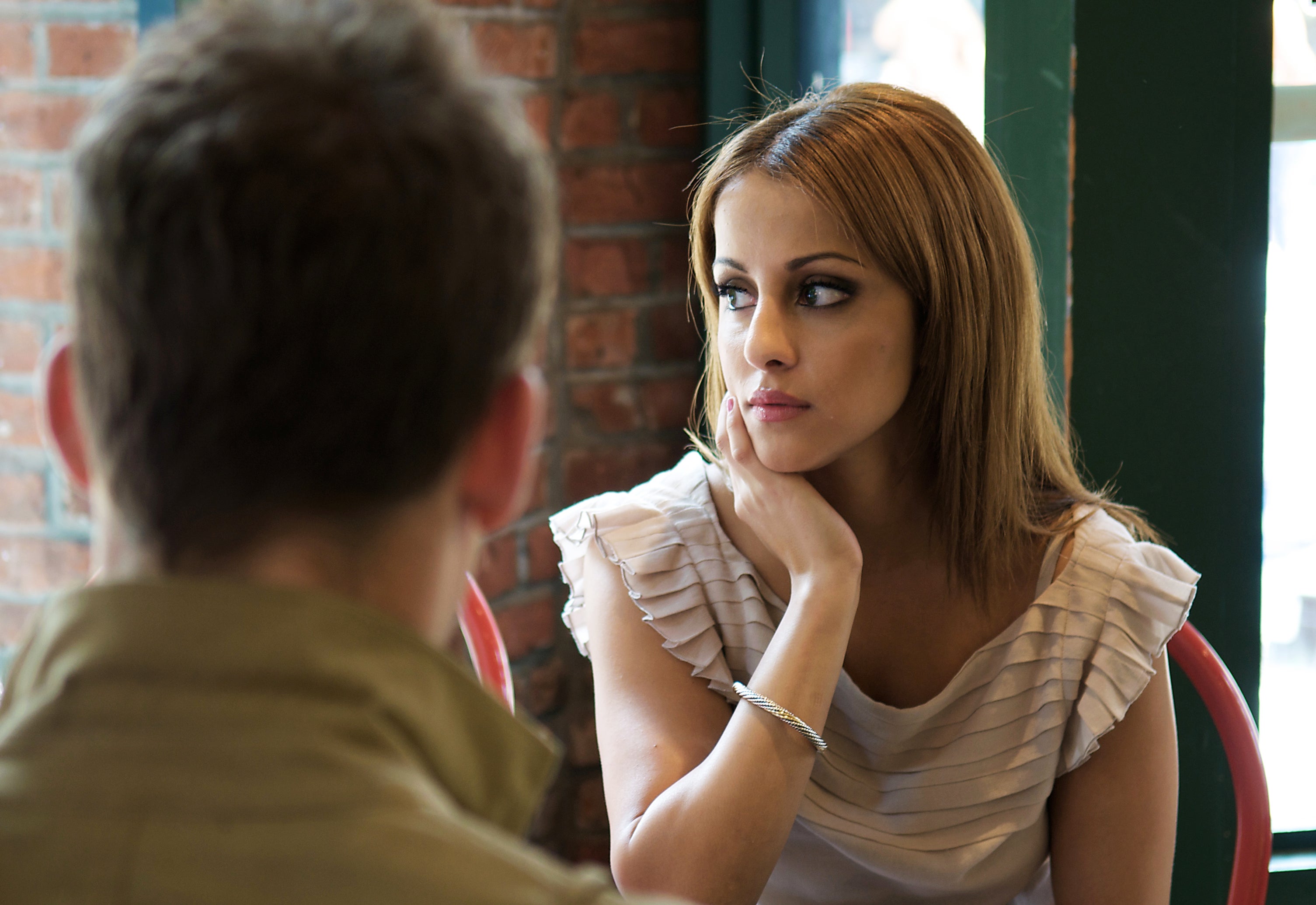The internet has always hated women. Misogyny thrives in spaces where the propensity for anonymity is high and any kind of accountability is low. Now, though, it seems that the internet also hates men, particularly the ones who date women.
If you’re looking for evidence, just spend a few minutes in a single straight woman’s social media algorithm. One quick look at mine and I’m inundated with clips and memes that take #MenAreTrash to another, sharper-toothed, frontier. “I hate when energy drinks are marketed towards men,” reads one meme on Instagram. “What could they possibly need energy for? Telling lies?” On X (Twitter), a post states: “Getting your heart broken by a noncommittal man with a slutty mustache is like losing chess to a dog.” Another reads: “One cool thing about dating men in your twenties is that you get to experience motherhood.”
Then there’s the litany of parody TikTok videos and Instagram reels reinforcing this same, deeply heterofatalistic message about modern dating. In this one, a man pretending to be talking to his therapist says he has an inclination to cheat on his girlfriend, but is worried about her finding out, in case it hurts his reputation. “Men in therapy probably”, reads the caption. Several other clips feature videos of women walking, all with the same overlaid text: “Don’t let the fact you’re attracted to men stop you from hating them.” Then there’s this viral TikTok featuring Steve Carell from The Office with the caption, “Dating men: Is it easy? No. Do I like it? No, I don’t. But do I do it? Yeah, I do.”
As tongue in cheek as it may be, the ubiquity of rhetoric like this online isn’t necessarily something to take so lightly. All of it sends the same, rather depressing message to women about what it’s like to date men today, which is basically: horrible. “Social media has created a space where extreme voices are amplified, and content that ridicules or diminishes men often spreads rapidly because it provokes strong emotional reactions,” explains Lorin Krenn, relationship coach and host of the podcast Masculine & Feminine Dynamics.
Part of this is about understanding how the internet works. Nuance and moderation just don’t click – instead, the algorithms reward outrage, which often means divisive content that clearly sits on one side of a debate. That way, it’s likely to attract an engaged, and ideally impassioned, audience who will fervently comment and like to their heart’s delight. “Black and white statements require less introspection, whereas the truth is always more nuanced,” says Krenn. “Saying ‘all men are bad’ is easier than saying, ‘I have been hurt by someone with damaging traits, my heart is afraid to open again, yet I know there are still good men out there.’”
That’s not to say there isn’t truth to what’s being said; in the dating space, Krenn has seen a major rise in the number of women publicly voicing anger, resentment, or dismissal toward men as a group, not just toward specific behaviours. “What was once limited to small communities or private conversations is now broadcast and consumed on a mass scale, and it has even become fashionable in some circles to speak about men in ways that would never be tolerated if directed at women,” he adds.

But is all this mere empty, misandrist rage designed to keep us staring at our screens or helping the next aspiring Love Island star go viral? Or is there a very real and important truth underneath it all? Certainly, among my single female friends at least, there seems to be a sense of camaraderie that comes from exchanging these kinds of memes and reels. One sends me different memes daily, and another frequently shares them to great acclaim in a WhatsApp group. They make me laugh, too – one trend depicting “men the day before they ghost you” is particularly popular. Typically, it shows a man gushing over a woman in a hyperbolic manner, telling her he wants to marry her and introduce her to his parents (also known as love-bombing). Yes, it might be insulting to men. But it’s also funny and relatable.
“From an interpersonal neurobiology perspective, humour like this can act as a defence mechanism,” says Jessica Baum, psychotherapist and author of Safe: An Attachment-Informed Guide to Building More Secure Relationships. “It helps regulate overwhelming feelings of rejection or abandonment by turning them into something laughable. On a nervous-system level, it’s a way to discharge pain and temporarily regain a sense of power.”
In this sense, engaging with this content could be perceived as a net positive. If it makes you feel better about a disheartening dating scenario, who are we to judge? There is a fine line, though. “If this humour becomes the dominant narrative, it reinforces a protective stance rather than opening us up to deeper, more vulnerable connection – and vulnerability is the very thing our nervous systems require to feel safe in a relationship,” explains Baum.
It also reinforces unhelpful stereotypes about dating, specifically those around attachment styles. Many of the negative clips and memes about male behaviour in dating revolve around the assumption that all men are emotionally unavailable, self-sabotaging, commitment-phobic cavemen. “Being emotionally unavailable is so fun I see why men do this,” reads one post on X, which has been parroted several times across the internet. Then there are those countless ghosting videos, which tap into a wider narrative around men being incredibly keen at first and then suddenly vanishing.
“The truth is that both men and women can struggle with avoidant attachment,” says Baum. “Avoidant attachment often looks like ghosting, or diving in quickly only to pull away when real intimacy shows up. This is a pattern I’ve seen frustrate many women, and culturally it has been stereotyped as a ‘male’ behaviour – but it’s not.” Still, there is truth to it (otherwise the memes wouldn’t hit home): according to a 2022 study published in the journal Behavioural Sciences, men are more likely to have an avoidant attachment style, whereas women are more likely to have an anxious attachment, which is characterised by a fear of being abandoned by your partner and can result in a requirement for constant reassurance.
But there are exceptions – and leaning too heavily into stereotypes will prevent us from seeing them. Because ultimately, all this is harming men and women. For women, it’s a case of getting trapped in a cycle of negativity that means we go looking for trouble where there might be none. We go into dates assuming the worst, and often projecting that onto the men themselves, subconsciously or not. “Culturally, we champion independence – self-sufficiency, self-reliance, and success – but what often gets overlooked is the loneliness and isolation that come with this way of being,” says Baum. “Many women buy into this ‘independence era’, but the messaging can sometimes backfire, leaving them more disconnected and hurting inside. The truth is, thriving happens in connection, not in isolation.”
For men, the consequences were explored in a recent survey of 100 single men conducted by The Cut, which highlighted the anxieties men have about being vilified on social media for their dating habits. “I am terrified of becoming the next viral TikTok,” a 28-year-old New York man told the publication. “All your responses are likely being circulated in a group chat,” a 26-year-old Texas man said. Many also pointed to West Elm Caleb, the man who became persona non grata on TikTok for allegedly ghosting several women in New York.
“It is concerning on many levels,” says Krenn of the proliferation of this kind of content online. “It harms men because it normalises a narrative that they are inherently unworthy, untrustworthy, or disposable. And it harms women, because it breeds cynicism and makes it harder to approach relationships with an open heart.” It also creates a divisive dating culture built on fear, resentment, and, in some cases, ragebait. “When misandry is normalised, men often either shut down and withdraw from dating, or they respond with equal hostility. Both reactions fuel the cycle of separation and leave little space for authentic intimacy and trust to grow.”
Short of half-heartedly repeating “not all men” like brainwashed cyborgs, it’s hard to know where to turn to improve any of this. Clearly, there are very real problems at the heart of the modern dating landscape, which are feeding a culture whereby it’s become normal to deride men in this way. But at some point, surely we have to find a way to move past this way of thinking? “To combat this cultural trend, we have to model and promote vulnerability, curiosity, and compassion in dating,” says Baum. “On a cultural level, that means moving away from glorifying radical self-reliance and instead valuing interdependence – because safety, healing, and thriving all happen in relationships, not in isolation.” On an individual level, it could also be as simple as switching up your social media algorithm. I’ve recently traded memes of terrible men for videos of kittens meeting big dogs. And I feel more optimistic already.



.jpeg?trim=129,0,129,0&width=1200&height=800&crop=1200:800)


